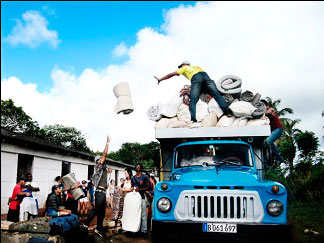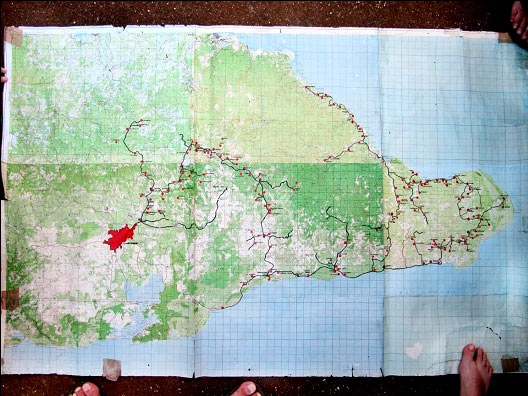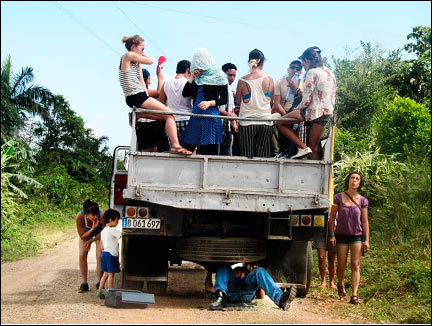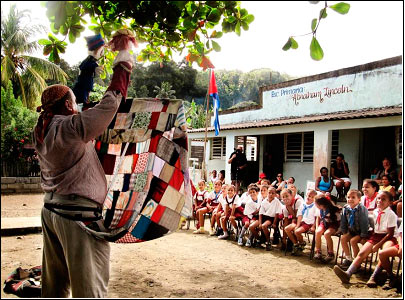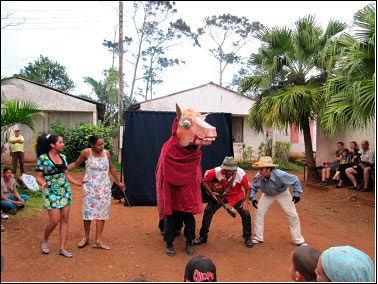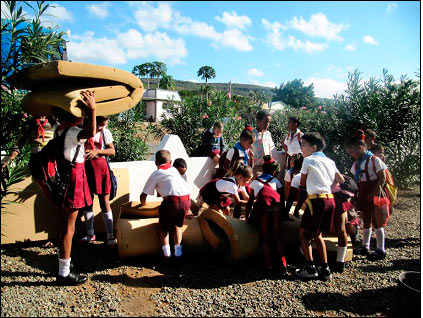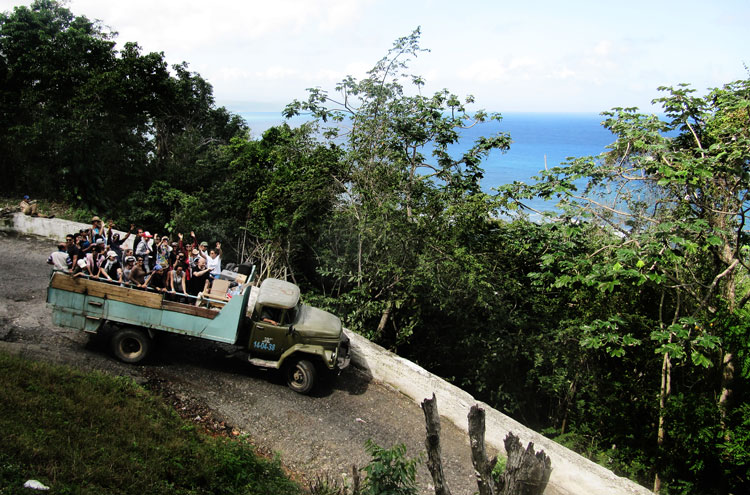Every year in the period of January 28 – March 3 the unique theatre caravan called La Cruzada Teatral presents performing arts for children and family audiences in the most remote areas of the eastern mountains of Cuba. This visit once a year – every time at the same date in the same village or school – creates a very special energy and communication between the performers and the audience.
La Cruzada is also a special platform for international exchange and cooperation, and the Cuban organizers and theatres are every year visited by several actors from abroad presenting their performances.
The 25th anniversary of La Cruzada took place last year, and in this context ASSITEJ Denmark and three Danish performances took part in the caravan. A journalist from Denmark also joined the caravan, and the resulting article was brought in a Danish newspaper. You can read an English translation of the article right here.
Danish dogma theatre in the mountains of Guantánamo
Guantánamo is predominantly known as the location of the infamous American military base, but there are other, more positive sides to this south eastern province of Cuba. Since 1991 a Cuban performing arts caravan has delivered theatre to a region where art is considered a social necessity. In 2015 a number of Danish theatre troupes joined the tour.
By Torben Stig Hansen
“Capero!” The warning comes in unison from a cluster of performers standing by the cab of the swaying truck. As experienced truck surfers, we all immediately bow down and the palm tree leaves whoosh over our heads.
We are about 60 theatre people on the truck, holding on to each others as the old, Russian, army green vehicle bounces down the narrow, absurdly potholed jungle road. Trailing behind us like a steadfast companion on our journey, a light blue truck comes along loaded with the sets and costumes of 14 theatre troupes, as well as rucksacks, mattresses, bags of rice and beans, and a refrigerator. Above us the sky is dotted with greatly wing-spanned vultures gliding under a scorching midday sun.
When eventually a small cluster of wooden houses appear on a hilltop in the far distance, I notice a sense of quiet jubilation among the actors from Cuba, Columbia, Spain and Denmark. This festival is something special – an opportunity for the performers to show their theatre acts to the people in the remotest parts of Cuba: the villages in the mountainous province of Guantánamo.
On tour from Guantánamo to Baracoa
La Cruzada Teatral, the name of the annual festival, sprung to life in 1991 in the wake of the Soviet Union collapse. Cuba was highly dependent on trade deals with the Soviet Union and the collapse led to a lengthy economic crisis with implications for all layers of the Cuban society. Lack of resources resulted in the closure of many theatres, and people, now struggling to pay for basic amenities like food and clothing, stopped going.
However, in the city of Guantánamo a group of young performers, determined to find an audience, decided to go against the current and organized a theatre tour from Guantánamo to Baracoa on the Eastern coast. They loaded their sets onto a herd of mules and travelled from village to village, performing in schools and civic centres across the province.
A few years later La Cruzada Teatral was rewarded state funding and lauded as a textbook example of a sociocultural initiative fully in line with the government’s long-term policy of providing education and health services to people in even the remotest parts of Cuba. The mules were exchanged for two snorting trucks which every year (in the period of January 28 – March 3) travel more than 1.800 kilometres, visiting 200 villages and reaching an audience of 145.000 people.
The only cultural event of the year
Long before the engine has come to a halt and the performers can disembark, the trucks are surrounded by a crowd of excited school children in white shirts and claret-coloured skirts or shorts. Behind them, further up on a ridge, a modest school building with corrugated sheet roofing sits against a majestic backdrop of green jungle and blue sky. Wooden huts, resting peacefully in the sun, scatter the surrounding hill area. The village is called El Naranjo and is inhabited by a few hundred people. La Cruzada is the only cultural event of the year and the 16 school children and their three teachers have been looking forward to this day for months.
The children lead the way to a structure consisting of a thatched roof held up by poles. This is the local civic centre and the setting for today’s two performances. With the help of the laughing children, two actors from El Dramático Guantánamo tell the wacky tale “La Historia de la Cucarachita” (“The Story about the Cockroach”). Afterwards the actress from El Arca performs the poetic puppet show “Cuento con Caricia” (“Fairy Tale with Caresses”). She plays all the roles and the children watch in quite awe.
Later, when the performers are packing up, Irene Muguercia, a 52-year-old teacher, tells us that La Cruzada’s visit is seen as part of the children’s education – the performances are afterwards discussed in the classroom and at home the children re-enact them to their families. This rare opportunity to experience art is seen as an important part of their upbringing and many children are inspired to become performers themselves.
Reciprocal creative inspiration
The journey continues through the rural districts and in the late afternoon we reach Los Llanos. Our home for the night is an old farm building that is normally used to house Cuban 7th-9th graders when they each year attend a mandatory month-long work experience programme doing fieldwork on farms. The building’s main room contains 25 bunk beds made out of old metal frames and skewed, chipped planks. On the walls and beams, scribbled in toothpaste, are the names of children: ”Ruben”, ”Margarita”, ”El Chico”.
The air brims with excited voices and laughter as we unpack our gear. Normally 10-12 Cuban theatre troupes participate in La Cruzada Teatral, but this year it is the festival’s 25th anniversary and a total of 20 troupes from six countries are participating. Everyone is excited to be part of it and eager to get to know each other both socially and professionally. There are four theatre troupes from Denmark: Teater Tix, Nørregaards Teater, MishMash International Theatre Company, and Sofie Faurschou of Teater Arrièregarden in a co-production with Cuban Teatro Andante.
“The foreign troupes – and not least the Danish ones – definitely have a big impact on La Cruzada in terms of bringing in new inspiration”, says Emilio Vizcaíno Ávila, who has been the festival’s director for the past three years. “It means a lot for the continuous development of the theatrical language – in particular in the Guantánamo province, but also in Cuba in general. Moreover, the international participation is fundamental in ensuring and strengthening support from our government institutions,” says the festival director.
Danish dogma theatre on donkey back
The participation of the Danish theatre troupes has been made possible through cooperation between the Danish and Cuban divisions of the International Association of Theatre for Children and Young People (ASSITEJ). The project is called “Theatre on donkey back” and was initiated by ASSITEJ Denmark with the aim of exploring the possibility of a performing arts which is mobile and universally understood. As part of the artistic challenge, each troupe has agreed to a set of dogmas: 1) the performance must not primarily be text-based, 2) it must not be longer than 25 minutes, and 3) all the props and sets must be able to fit on the back of a single donkey – just as when La Cruzada started out 25 years ago.
For Sofie Faurschou, the work conditions are a far cry from what she is used to: “Actually, I’ve always felt most at ease on a dark stage, where I can’t have eye contact with the audience when performing. But I’m completely impressed with my fellow performers’ ability to be fully on it from the moment we’re off the truck in a new village – especially when we’re all a bit woozy and dehydrated after a long mountain drive. There’s mostly no time for rehearsals or mental preparation, as the audience is already there when we arrive. They follow our every move when we’re setting up and getting our costumes on, so the show is kind of already on. It’s transgressive, but also very inspiring.” Sofie Faurschou looks pensive for a moment before adding: “I love the idea of theatre coming to the people, exactly where they are.”
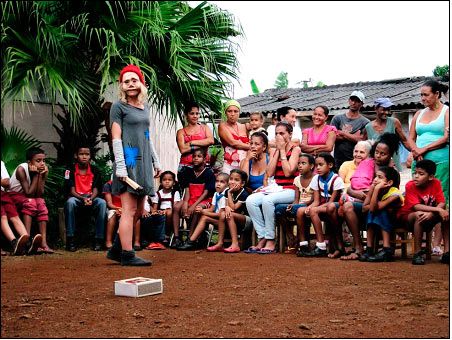
Teater Tix performing The Little Match Girl in the village of Palma Clara. (Photo by Torben Stig Hansen)
“La Cruzada is a social necessity”
Ana Chelys Matos Toirac was 6 years old when she met and became friends with the clown Tío Tato. That was in 1996 when La Cruzada passed though her hometown La Máquina, only a few kilometres from Los Llanos. Tío Tato (real name Carlos Pérez) was in the theatre troupe Teatro Guiñol de Guantánamo and Ana Chelys decided to travel on with them and watch all Tío Tato’s performances. At the end of the festival Ana Chelys was certain: she wanted to be a professional actress and join La Cruzada. Today, 12 years later, and having finished her acting training and a work placement with Guiñol de Guantánamo, she is performing in La Cruzada, displaying her great comic talent in Teatro Ríos’ cowboy farce “Pepín el Burrito”.
“The best thing about La Cruzada is the love between the performers and the audience”, says Ana Chelys. “We always consider the audience when creating our acts. Many of them haven’t seen a theatre show before and they regard a puppet doll as a new technology in line with a TV. But the most important thing about a theatre show is that it functions as a mirror to the audience’s own lives.”
”La decisión es tuya” (“The decision is yours”) is a play about alcoholism and domestic violence that Ana Chelys has toured with several times. She says the play always provoke spontaneous outbursts from the audience, because in every village there is an alcoholic man beating his wife.
“When the audience can relate to the story, they start reflecting about their own lives. The men start thinking about how they are treating their own wives. Peoples’ minds are expanded when we perform. La Cruzada is a social necessity.”
A deeper relationship with the people
Festival manager Emilio Vizcaíno Ávila is in full agreement with Ana Chelys and hopes that La Cruzada will one day be able to stay for a week in each location.
“It is important to develop a deeper relationship with the people. The different communities living in the mountains of Guantánamo are very different, but having contact with the teachers in the villages helps us understand the needs of each community. We also need to allocate resources to hold workshops with the audiences and the local drama teachers.”
Emilio Vizcaíno Ávila acknowledges that his vision would require a considerable raise in state funding and ultimately a stronger Cuban economy. Along with most of his fellow countrymen he is hoping that the current thaw in relations between Cuba and the US will soon lead to a lifting of the 55-year-old embargo.
For Juan González Fiffe, the director of Teatro Andante, it is an absolute necessity that the two countries open up towards each other.
“It is important to maintain the authenticity of the Cuban culture, but we must also remember that the greatest human wealth is found in cultural diversity,” says Fiffe. “The American and Cuban people need to work together and exchange experiences. But unless we recognize the necessity of mutual respect, the relationship will not improve.”
Ordinary people taking ownership
After three days in Los Llanos our journey continues East. On a bright sunny day, the two trucks loaded with theatre move slowly down the mountain roads navigating each hairpin bend with great precision, safely reaching the village of Yumurí by the sea.
About 20 performances are planned for Yumurí and the immediate vicinity, and we are all going to stay privately with local people: La Cruzada Teatral is to a large degree made possible by ordinary people taking ownership of the festival.
11 Danes, four Cubans, two Turks and one Finn make up the so-called Danish team which is staying with Mercedes Capdesuñer, a 49-year old single mum with five children. Our dwelling is a wooden hut with a veranda and courtyard that we share with a number of hens and dogs, as well as two sows and 18 suckling piglets darting around, sticking their snouts in our discarded coconut shells.
Mercedes Capdesuñer gets very emotional when trying to explain what La Cruzada means to her. She was 24 years old when the theatre caravan first came to Yumurí, and she has unhesitatingly opened up her house to performers and helped with the cooking every year since. A few wonderful days later we must say goodbye and continue our journey. Mercedes tells us how happy and proud she is that La Cruzada has visited Yumurí once again and that we stayed in her home.
“You are all part of my family.”
Torben Stig Hansen is MA In Modern Culture and Cultural Communication, and manager at Danish theatre company Batida. This article was originally published in Danish newspaper Information on April 22, 2015.


